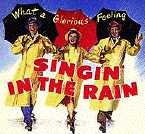
 With a happy refrain, I'm bikin in the rain!
With a happy refrain, I'm bikin in the rain! 
 I was sitting around eating food and working my way through Season 2 of Breaking Bad and got itchy for some bike action. Looked out the window and saw it wasn't raining. Looked at the street and saw people walking by normally. So I put on the helmet, started my Cyclemeter and hit the road!
I was sitting around eating food and working my way through Season 2 of Breaking Bad and got itchy for some bike action. Looked out the window and saw it wasn't raining. Looked at the street and saw people walking by normally. So I put on the helmet, started my Cyclemeter and hit the road!
Short ride, great energy -- down to the Battery. Stop, take a picture of the harbor in storm mode, when big fat drops start pinging my helmet. Ping. Ping. Ping. Strap up and head out. No problem. It's summer heat and summer rain, so we all get soaked, everyone, but who cares.
A short ride, up and back.
Here's the map and the stats: 4.6 miles, 27 minutes.
Here's the song. ![]()
 Proposal: A new kind of blog comment system
Proposal: A new kind of blog comment system 
 I'm almost 100 percent sure that scripting.com was the first blog to have comments. And I'm equally sure that it was the first to have its comments flame out. The flameout was a good thing, although it didn't feel like it at the time, because it created the first wave of blogs. And when their comments flamed out, there were subsequent waves of new blogs.
I'm almost 100 percent sure that scripting.com was the first blog to have comments. And I'm equally sure that it was the first to have its comments flame out. The flameout was a good thing, although it didn't feel like it at the time, because it created the first wave of blogs. And when their comments flamed out, there were subsequent waves of new blogs.
Once the blogosphere had grown sufficiently that the central role scripting.com played was largely forgotten, I brought comments back. I've been mostly satisfied with them, but certain subjects evoke predictable and futile "arguments" in response and unless moderation is applied, they will spiral into a flamy back and forth that you can find in any of thousands of different places in the blogosphere. So I moderate according to a few basic guidelines.
1. Keep your responses focused on the piece you're responding to.
2. No ad hominem attacks.
3. Add value, a new idea, perspective, point of view. Simply saying "I disagree" is not helpful and likely won't get approved.
4. When moderating I'm always mindful of whether the comment needs to be tacked onto my post or if it would do better as a post of its own on the author's blog. I think a lot of people post comments just to get attention. If I get the idea that's what's going on, I don't approve the comment. That's a misuse of the comments, and disrespectful of the community, and of the blog's author.
So all this has led me to an idea that comments could work quite a bit differently and remove the incentives to replay old arguments, and keep the comments focused on the ideas being responded to.
1. A fixed commenting period for each post of 24 hours.
2. Until the period expires, none of the comments would be visible to other commenters.
3. You could edit and refine your comments during the period.
4. There would be a length limit of 1000 characters to keep people from using comments in place of a blog post. No one is going to read a blog post in a comment.
5. After the commenting period is over, the comments would become visible, and no further comments would be permitted.
I know some people think that blogs are conversations, but I don't. I think they're publications. And I think the role of comments is to add value to the posts. If you want to rebut a post, then you can create your own blog and post your rebuttal there.
I've always felt this way about what blogs are, and in a similar way I feel Twitter is not a conversational medium. it is even more inappropriate to try to converse there because of the 140-character limit.
I've disabled comments for this post to give a brief demo of what it might feel like to find other outlets for your ideas, or to allow you more time to consider your response.



